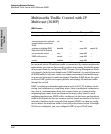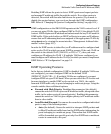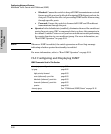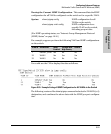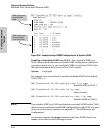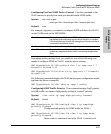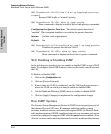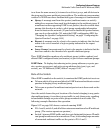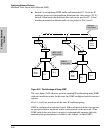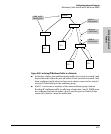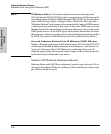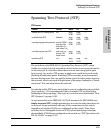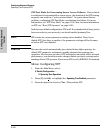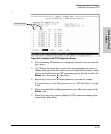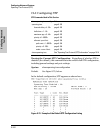
9-95
Configuring Advanced Features
Multimedia Traffic Control with IP Multicast (IGMP)
Configuring Advanced
Features
to or from the same source(s) is termed a multicast group, and all devices in
the group use the same multicast group address. The multicast group running
version 2 of IGMP uses three fundamental types of messages to communicate:
■ Query: A message sent from the querier (multicast router or switch)
asking for a response from each host belonging to the multicast group. If
a multicast router supporting IGMP is not present, then the switch must
assume this function in order to elicit group membership information
from the hosts on the network. (If you need to disable the querier feature,
you can do so through the CLI, using the IGMP configuration MIB. See
“Changing the Querier Configuration Setting” on page “Configuring the
Querier Function” on page 9-94.)
■ Report: A message sent by a host to the querier to indicate that the host
wants to be or is a member of a given group indicated in the report
message.
■ Leave Group: A message sent by a host to the querier to indicate that the
host has ceased to be a member of a specific multicast group.
Thus, IGMP identifies members of a multicast group (within a subnet) and
allows IGMP-configured hosts (and routers) to join or leave multicast groups.
IGMP Data. To display data showing active group addresses, reports, que-
ries, querier access port, and active group address data (port, type, and
access), see “IP Multicast (IGMP) Status” on page 10-16.
Role of the Switch
When IGMP is enabled on the switch, it examines the IGMP packets it receives:
■ To learn which of its ports are linked to IGMP hosts and multicast routers/
queriers belonging to any multicast group
■ To become a querier if a multicast router/querier is not discovered on the
network
Once the switch learns the port location of the hosts belonging to any partic-
ular multicast group, it can direct group traffic to only those ports, resulting
in bandwidth savings on ports where group members do not reside. The
following example illustrates this operation.
Figure 9-67 on page 9-96 shows a network running IGMP.
■ PCs 1 and 4, switch 2, and all of the routers are members of an IP multicast
group. (The routers operate as queriers.)
■ Switch 1 ignores IGMP traffic and does not distinguish between IP multi-
cast group members and non-members. Thus, it is sending large amounts
of unwanted multicast traffic out the ports to PCs 2 and 3.




